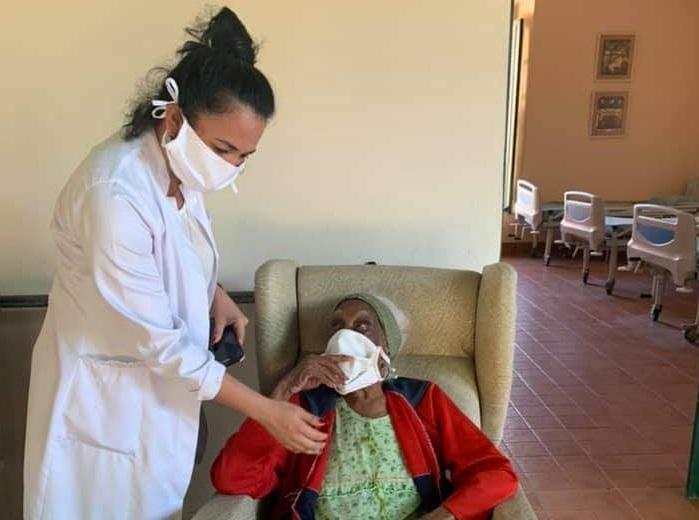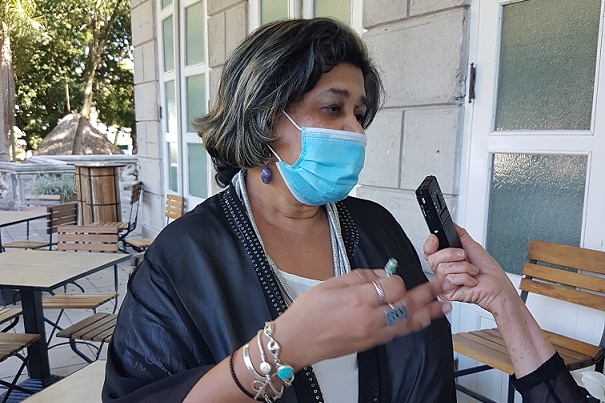
Project ¨Cuidando a las personas mayores¨ ( Caring for the elderly ) is being developed in Havana.
The project Caring for the Elderly in times of COVID-19 is being developed in Havana from March 2020 to the present, says Dr. Lilian Rodríguez Rivera, director of the Research Center on Aging, Longevity and Health (CITED) and vice-president of the Cuban Society of Geriatrics and Gerontology.

Dr. Lilian Rodríguez Rivera, director of CITED. Photo: Taken from Radio Cudad Habana.
According to a report by Radio Ciudad Habana, this initiative aims at increasing prevention and confrontation of COVID-19 in the 15 municipalities of the capital, supported by European non-governmental organizations (WeWorld GVC Onlus) and the movement for peace (MPDL).
Among its objectives are: to improve the state of health with emphasis on vulnerable groups, to guarantee the logistic assurance of medicines and equipment and to consolidate the strategies of education, training and research.
It also promotes the combination of science and new information technologies for the care of the elderly, a key factor in times of pandemic.
The specialist said that the results obtained in this endeavor are evidenced in the increase to more than 30 homes for the elderly in the capital and support to CITED with equipment, beds with handrails, mattresses for the prevention of pressure ulcers, armchairs for companions, wheelchairs and toilets, among other elements.
In addition, 80 tablets were distributed for the psychological care of the elderly in the assistance centers in the communities of Havana.
Rodríguez Rivera added that medicines were acquired for the elderly, such as antidepressants and atypical neuroleptics, as well as immunological markers for the Finlay Vaccine Institute and the National Center for Biopreparations (BIOCEN).
More than three thousand elderly people linked to nursing homes, 470 grandfathers and grandmothers with hypoacusis treatment have benefited from this program.
She added that more than a hundred professionals and nursing home staff have been involved.
According to the center's director, the main gap was the urgency to design and promote the initiative due to the pandemic.
She also explained the need to protect the elderly, which is a challenge, and the alliance between the European Civil Society and the Cuban Scientific Societies solidify this cooperative and helpful process with the aim of safeguarding the health of the elderly at all times.
The doctor specified that the capabilities installed in the homes for the elderly is the essence of the initiative, as well as the training of both caregivers and patient assistants, to benefit this age group, with hearing aids, with a view to their reincorporation into working life.
The Caring for the Elderly project involved the collaboration of entities such as CITED, the Provincial Health Directorate in Havana, the Neurosciences Center and the Finlay Institute.
Data from the National Office of Statistics and Information (ONEI) indicate that Cuba has gone from 4.6 percent of people over 60 years of age, according to the 1899 census, to 21.3 percent in 2020, and it is expected that by 2050 they will represent 34.9 percent, making it the most aged country in the Latin American region.

This ONEI study reports that the province of Havana, with 22.5% (1,546 thousand) per 1,000 children and young people, ranks third in the country, behind Artemisa with 19% (97,6789) and Pinar del Río with 22.1% (128,914).
In 2020, the capital had a population of 479,289 in the 60 years and over age group. On the other hand, the capital's Plaza de la Revolución municipality is presented as the most aged in the country, reflecting 27.5 percent of its population aged 60 and over in 2016 and 28.9 percent in 2020.